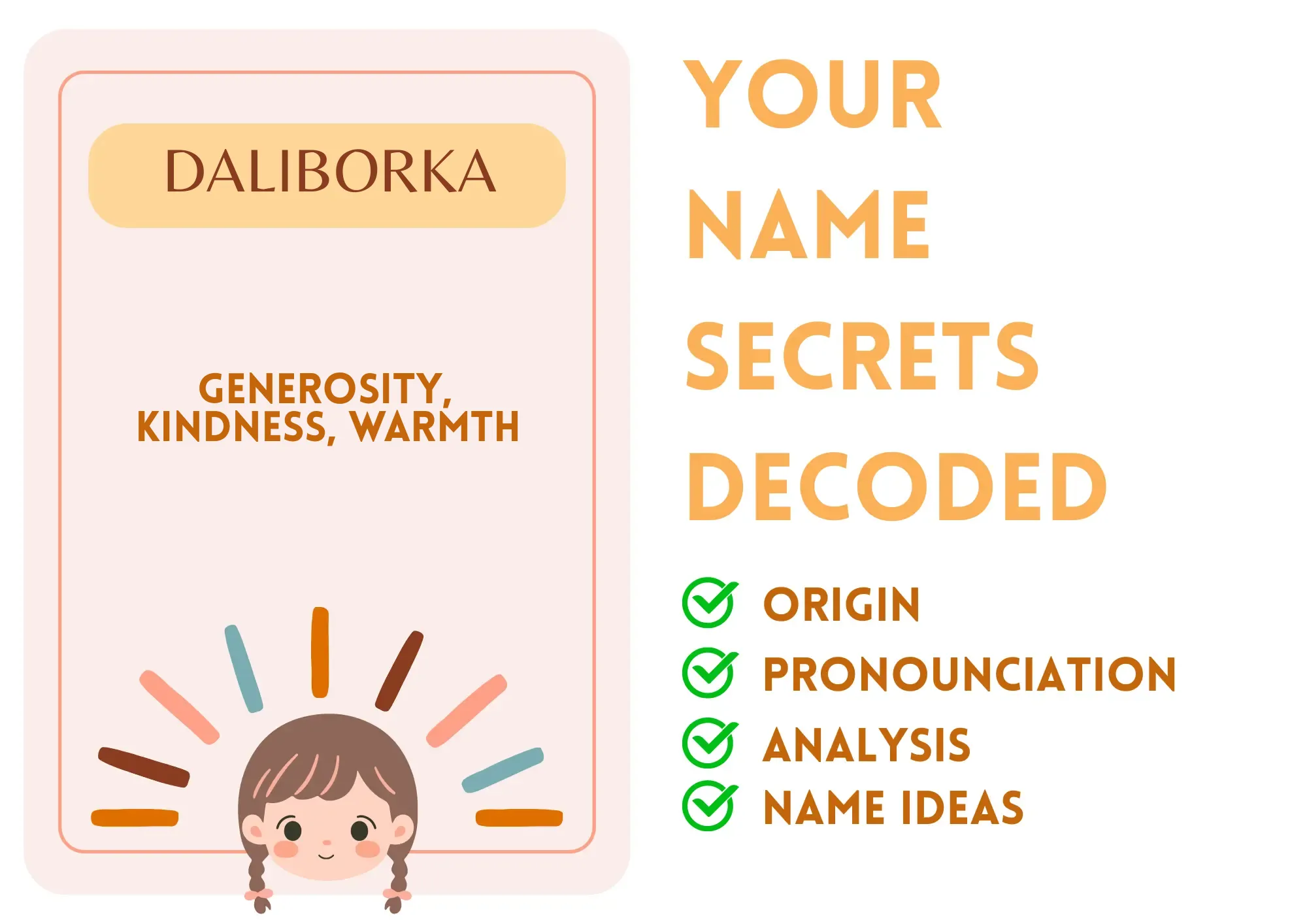
Daliborka
Daliborka is a unique and culturally significant name of Slavic origin, often associated with warmth, generosity, and kindness. It is predominantly a feminine name and is used primarily in regions such as Poland and other Slavic countries. The name carries a sense of belonging and traditional values, making it appealing for parents looking for a name that resonates with cultural heritage.
Daliborka evokes feelings of approachability and compassion. It is generally seen as an affectionate name. Its structure makes it easy to write and pronounce, although it may be less familiar to those outside of Slavic cultures. Common nicknames like Dala and Bora simplify its usage in everyday interactions.
Though not widely known in popular culture, its uniqueness stands out. Daliborka may sometimes be referenced in folklore or local tales, signifying strong female characters embodying resilience and care.
Basic Information
Gender: Girl
Sounds Like: DAH-lee-bor-ka
Pronunciation Explanation: The name is pronounced with emphasis on the first syllable 'DAH,' followed by 'lee' and 'bor' and ending with 'ka.'
Summary and Meaning
Meaning: generosity, kindness, warmth
Origin: The name Daliborka has Slavic origins, deeply rooted in the languages and cultures of Eastern Europe.
Usage: Daliborka is traditionally a feminine name and is primarily used for girls.
Name Number (Chaldean)
Name Number (Pythagorean)
Popularity (Global Rank)
Overall: 34150
Girls: 48800
Most Popular in
Religious and Cultural Significance
Religion: Slavic Paganism and Christianity
Background: In Slavic cultures, names like Daliborka often reflect historical values of community and kinship, resonating with both pagan and Christian traditions.
Cultural Significance: Daliborka reflects Slavic heritage and is commonly associated with positive virtues such as kindness and generosity. It is often chosen to honor family traditions.
Historical Significance: Historically, names like Daliborka have been prevalent in Slavic folklore, where female characters often demonstrate strength and nurturing qualities.
Popular Culture
Literature and Mythology: While there are fewer references in mainstream literature, folklore may feature characters named Daliborka representing virtues like compassion and bravery.
Movies and Television: Daliborka is less commonly found in modern media but could appear as an authentic representation of Slavic culture in local productions.
Feelings and Perceptions
Perception: Daliborka is generally perceived positively, seen as an endearing and friendly name with traditional roots.
Positive Feelings: Friendly, warm, inviting, strong, unique, nurturing.
Negative Feelings: May be perceived as unfamiliar or difficult to pronounce for non-Slavic speakers.
Practical Considerations
Ease of Writing and Calling: The name Daliborka is moderate in length, consisting of eight letters and four syllables, making it relatively easy to remember but potentially complex for quick utterances.
Common Typos and Misspellings: Daliborka,Dali Borka,Dalborka,Dalibork
Common Nicknames: Dala,Bora,Dali
Daliborka Popularity
Daliborka Usage and Popularity By Country
| Country | Rank (Overall) |
|---|---|
| Serbia | 253 |
| Montenegro | 279 |
| Croatia | 537 |
| Slovenia | 748 |
| Malta | 4819 |
| Switzerland | 5611 |
| Luxembourg | 7707 |
| Bulgaria | 9750 |
| Germany | 9869 |
| Norway | 12941 |
Daliborka Usage and Popularity By City
| City | Rank (Overall) |
|---|---|
| Zurich | 4268 |
| Paris | 21699 |
| Melbourne | 17543 |
| Sydney | 24786 |
| London | 46025 |
| Frankfurt Am Main | 4742 |
| Grand Rapids | 3957 |
Compatibility Analysis
Famous Persons Named Daliborka
Related Names
Similar Sounding Names:
Aliborka,Talibora,Maliborka

